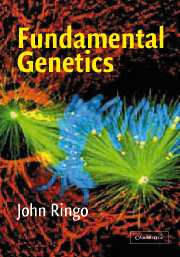Book contents
- Frontmatter
- Contents
- Preface
- Acknowledgments
- Chapter 1 Life Forms and Their Origins
- Chapter 2 Nucleic Acids
- Chapter 3 Proteins
- Chapter 4 Simple Chromosomes
- Chapter 5 Chromosomes of Eukarya
- Chapter 6 Genome Content
- Chapter 7 RNA Synthesis 1: Transcription
- Chapter 8 RNA Synthesis 2: Processing
- Chapter 9 Abundance of RNAs in Bacteria
- Chapter 10 Abundance of RNAs in Eukarya
- Chapter 11 Protein Synthesis
- Chapter 12 DNA Replication
- Chapter 13 Chromosome Replication
- Chapter 14 Molecular Events of Recombination
- Chapter 15 Micromutations
- Chapter 16 Repair of Altered DNA
- Chapter 17 Reproduction of Bacteria
- Chapter 18 Horizontal Gene Transfer in Bacteria
- Chapter 19 Cell Cycles of Eukarya
- Chapter 20 Meiosis
- Chapter 21 Chromosomal Abnormalities
- Chapter 22 Life Cycles of Eukarya
- Chapter 23 Reproduction of Viruses
- Chapter 24 Genetic Processes in Development
- Chapter 25 Sex Determination and Dosage Compensation
- Chapter 26 Cancer
- Chapter 27 Cutting, Sorting, and Copying DNA
- Chapter 28 Genotyping by DNA Analysis
- Chapter 29 Genetically Engineered Organisms
- Chapter 30 Genomics
- Chapter 31 Behavior of Genes and Alleles
- Chapter 32 Probability and Statistics Toolkit
- Chapter 33 Genes, Environment, and Interactions
- Chapter 34 Locating Genes
- Chapter 35 Finding and Detecting Mutations
- Chapter 36 Cytoplasmic Inheritance
- Chapter 37 Genetic Variation in Populations
- Chapter 38 Mutation, Migration, and Genetic Drift
- Chapter 39 Natural Selection
- Chapter 40 Quantitative Genetics
- Chapter 41 Speciation
- Chapter 42 Molecular Evolution and Phylogeny
- Glossary
- Index
Chapter 19 - Cell Cycles of Eukarya
Published online by Cambridge University Press: 05 June 2012
- Frontmatter
- Contents
- Preface
- Acknowledgments
- Chapter 1 Life Forms and Their Origins
- Chapter 2 Nucleic Acids
- Chapter 3 Proteins
- Chapter 4 Simple Chromosomes
- Chapter 5 Chromosomes of Eukarya
- Chapter 6 Genome Content
- Chapter 7 RNA Synthesis 1: Transcription
- Chapter 8 RNA Synthesis 2: Processing
- Chapter 9 Abundance of RNAs in Bacteria
- Chapter 10 Abundance of RNAs in Eukarya
- Chapter 11 Protein Synthesis
- Chapter 12 DNA Replication
- Chapter 13 Chromosome Replication
- Chapter 14 Molecular Events of Recombination
- Chapter 15 Micromutations
- Chapter 16 Repair of Altered DNA
- Chapter 17 Reproduction of Bacteria
- Chapter 18 Horizontal Gene Transfer in Bacteria
- Chapter 19 Cell Cycles of Eukarya
- Chapter 20 Meiosis
- Chapter 21 Chromosomal Abnormalities
- Chapter 22 Life Cycles of Eukarya
- Chapter 23 Reproduction of Viruses
- Chapter 24 Genetic Processes in Development
- Chapter 25 Sex Determination and Dosage Compensation
- Chapter 26 Cancer
- Chapter 27 Cutting, Sorting, and Copying DNA
- Chapter 28 Genotyping by DNA Analysis
- Chapter 29 Genetically Engineered Organisms
- Chapter 30 Genomics
- Chapter 31 Behavior of Genes and Alleles
- Chapter 32 Probability and Statistics Toolkit
- Chapter 33 Genes, Environment, and Interactions
- Chapter 34 Locating Genes
- Chapter 35 Finding and Detecting Mutations
- Chapter 36 Cytoplasmic Inheritance
- Chapter 37 Genetic Variation in Populations
- Chapter 38 Mutation, Migration, and Genetic Drift
- Chapter 39 Natural Selection
- Chapter 40 Quantitative Genetics
- Chapter 41 Speciation
- Chapter 42 Molecular Evolution and Phylogeny
- Glossary
- Index
Summary
Overview
In eukarya, as in bacteria and archaea, single cells reproduce asexually via a cell cycle. The cell cycle of eukarya, though, is more complex and elaborately regulated. The large, linear chromosomes of eukarya, whose DNA is packaged in chromatin, are replicated once per cycle, and copies are apportioned to daughter cells with great accuracy in a nuclear division phase, mitosis. The phases of the cell cycle and the main points of cell-cycle regulation are described in this chapter.
Keeping Track of Chromosome Number
Ploidy refers to the number of chromosome sets per cell nucleus. A euploid cell has an integer multiple of chromosome sets. Normal sex cells are haploid, having one set of chromosomes; sex cells unite to make zygotes, diploid cells with two sets of chromosomes.
In sexually reproducing eukarya, the haploid chromosome number of a species is N, and the diploid number is 2N. A gamete has N chromosomes, and most somatic cells of plants and animals have 2N chromosomes. Some cells, though, are polyploid – i.e., they have three or more sets of chromosomes. For example, in humans N = 23; a sperm has 23 chromosomes, a skin cell has 46 chromosomes, and a liver cell has 92 or more chromosomes. Mitosis works the same no matter what the cell's ploidy.
However – and this is important – the cell's ploidy normally does not change with the phase of the cell cycle, even though the number of copies of the genome does change.
- Type
- Chapter
- Information
- Fundamental Genetics , pp. 172 - 181Publisher: Cambridge University PressPrint publication year: 2004



